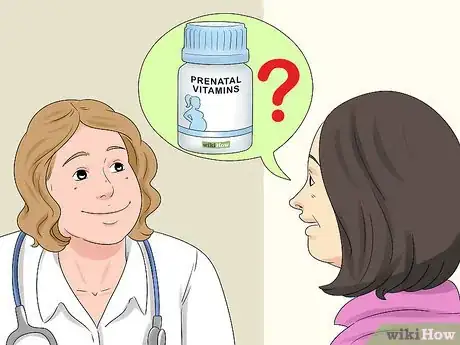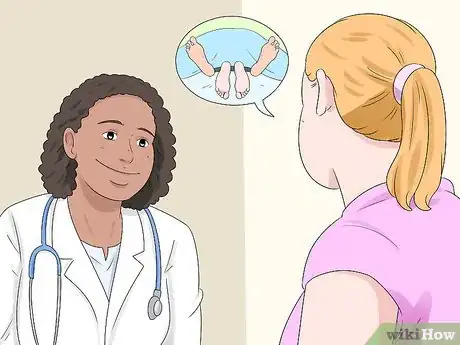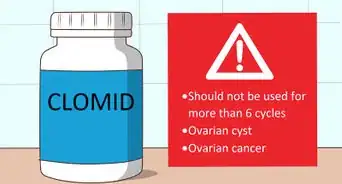This article was co-authored by Debra Minjarez, MS, MD. Dr. Debra Minjarez is a board certified Obstetrician & Gynecologist, Fertility Specialist, and the Co-Medical Director at Spring Fertility, a Fertility Clinic based in the San Francisco Bay Area. She has previously spent 15 years as the Medical Director of Colorado Center for Reproductive Medicine (CCRM) and has also worked as the Director of the Reproductive Endocrinology and Infertility at Kaiser Oakland. Throughout her professional life, she has earned awards such as the ACOG Ortho-McNeil Award, the Cecil H. and Ida Green Center for Reproductive Biology Sciences NIH Research Service Award, and the Society for Gynecologic Investigation President’s Presenter Award. Dr. Minjarez received her BS, MS, and MD from Stanford University, completed her residency at the University of Colorado, and completed her fellowship at the University of Texas Southwestern.
There are 13 references cited in this article, which can be found at the bottom of the page.
This article has been viewed 26,262 times.
As a woman 30 years or older, you may be worried about how fertile you are. Though fertility can decline in your 30s and 40s, everyone’s body is different and a number of factors can affect whether you can get pregnant once you are 30 and beyond. Adopting a healthy lifestyle, maintaining a healthy diet, and taking supplements can all help boost your fertility. You should also track your ovulation and maintain an active sex life to increase your chances of getting pregnant. If you are having issues with your fertility or infertility runs in your family, speak to your doctor about next steps.
Steps
Following a Healthy Diet and Lifestyle
-
1Eat a balanced diet so you can maintain a healthy weight. Being overweight or underweight can negatively impact your fertility. Weight fluctuations can cause your periods to be irregular and reduce your chances of getting pregnant. Maintain a diet high in healthy protein like chicken, fish, tofu, and beans, as well as fresh fruits and vegetables and whole wheat grains.[1]
- Avoid eating foods high in trans fats and refined sugar.
-
2Have salmon and eggs regularly to increase your omega-3 fatty acids. Try eating salmon 1-2 times a week and eggs that are fortified with DHA, a fatty acid. Increasing your omega-3 fatty acids can help to improve your fertility and your overall health.[2]Advertisement
-
3Avoid consuming high amounts of alcohol. Cut down on your alcohol consumption to 1-2 drinks a week. This can ensure your fertility levels stay high.[3]
- If you have a male partner, he should also maintain low alcohol consumption, no more than 14 units a week spread out over 3 days or more. Drinking too much alcohol can negatively affect the quality of his sperm.
-
4Limit your caffeine to 200 mg a day. You don't have to give up your morning coffee altogether, but if you're hoping to conceive, you shouldn't have more than 1-2 cups. Consuming more caffeine than that can have a negative impact on your fertility.[4]
- An 8 fl oz (240 ml) cup of coffee contains 96 mg of caffeine.[5]
- An 8 fl oz (240 ml) cup of black tea contains 47 mg of caffeine, while green tea contains 28 mg.
- While it varies according to the brand, cola averages around 22 mg of caffeine for an 8 fl oz (240 ml) soda. However, keep in mind that sodas are typically sold in containers that are 12 fl oz (350 ml) or larger.
-
5Try not to smoke or be around smokers. Smoking can negatively affect your health and your fertility. If you smoke, try to quit or reduce your smoking habit. Stay away from areas where there is cigarette smoke, such as in the homes or cars of people who smoke.[6]
- A man’s sperm can also become less potent if he smokes a lot or inhales second-hand smoke.
-
6
-
7Do yoga or breathing exercises to reduce stress. High stress levels have been shown to negatively affect fertility in individuals over 30 years old. Try to stay relaxed and calm by doing yoga regularly at home or at a local yoga studio. Do breathing exercises at home in the morning before you start your day or at night before bed so you can feel centered and calm.[8]
Taking Supplements
-
1Have folic acid supplements to improve ovulation. Look for folic acid supplements at your local health food store or online. Make sure the supplement contains mostly folic acid and no additives or preservatives. Follow the dosage instructions on the label and never take more than the recommended amount.[9]
-
2Take fish oil and magnesium supplements to boost your fertility. Fish oil contains omega-3 fatty acids, which are great for fertility health. Magnesium can also help to keep your fallopian tubes healthy and improve your chances of getting pregnant. Look for these supplements at your local health food store or online.[10]
- Check the label to make sure the supplements contain mostly minerals and no preservatives or additives.
-
3Ask your doctor about taking prenatal vitamins to get pregnant. Taking prenatal vitamins in low doses can help to prepare your body for pregnancy and boost your fertility. Prenatal vitamins can be purchased at your local health food store or online.[11]
Maintaining Your Menstrual and Sexual Health
-
1Keep track of your menstrual cycle to confirm it is regular. A regular menstrual cycle is a good sign your fertility levels are high. Most menstrual cycles are considered normal if they last 21-35 days, with ovulation occurring between day 6 and day 14. Write down your ovulation days on a calendar or use a tracker on your smartphone so you can confirm your periods are regular month to month.[12]
- If your periods are not regular, or they tend to last longer than 35 days, speak to your doctor. This may mean you are ovulating less and need to check on your fertility levels.
-
2Stop taking birth control once you decide to get pregnant. Continue taking birth control until you decide you want to become pregnant. You can then go off of birth control, under the supervision of your doctor. You will need to wait several months for the birth control to leave your system before you can try to conceive.
- If you do not want to get pregnant right away but want to boost your fertility so you can conceive in the future, take your birth control regularly. Birth control can help your menstrual cycle to stay regular and consistent. Have oral birth control at the same time every day and try not to skip any days to avoid messing up your cycle.
-
3Have sex weekly to keep your cycle regular. Engaging in regular sexual intercourse, at least once a week, can help to keep your menstrual cycle regular and ensure you are ovulating. A healthy sex life can help you produce more estrogen, which can then help to boost your fertility levels.[13]
- Try to have sex weekly or several times a month to keep your fertility levels up. You may then have an easier time getting pregnant once you decide you are ready.
-
4Use sexual lubricants that are sperm-friendly. When you do engage in sexual intercourse, make sure you use natural lubes like canola, peanut, vegetable, mineral, or baby oils. These natural oils will make it easier for sperm to fertilize an egg during intercourse. You can also buy over-the-counter lubricants that are sperm-friendly at your local drug store or online.[14]
- Avoid lubricants like saliva and olive oil, as well as commercial lubricants that are not marked “sperm-friendly,” as they can inhibit the potency of sperm.
-
5Avoid douching. Douching is when you use scented wipes or cleansers on your vagina to “clean” it. This practice can actually remove the normal, protective bacteria in your vagina and put you at risk of bacterial infections. Certain bacterial infections in your vagina can cause fertility issues.[15]
Speaking to Your Doctor
-
1Talk to your doctor if infertility runs in your family. Infertility can be caused by a number of factors, including genetics. Discuss this possibility with your doctor and get fertility tests done to determine if you have fertility issues. Addressing fertility issues early can increase your chances of conceiving.[16]
-
2Speak to your doctor if you have unprotected sex regularly but cannot get pregnant. If you are off birth control and do not use contraception of any kind when you have sex, your chances of getting pregnant increase significantly. You may want to check on your fertility levels if you do this regularly and do not get pregnant, as this could indicate you may have fertility issues.[17]
-
3Ask your doctor about freezing your eggs. Freezing your eggs when you are in your 30s can then allow you to get pregnant in the future through assisted reproductive technology. Your frozen eggs will be kept in a bank so you can access them when or if you decide you’d like to become pregnant at an older age. Your doctor can refer you to an egg bank where you can get this done safely.[18]
- Keep in mind freezing your eggs does not guarantee you will be able to conceive at an older age but it can increase your chances.
- Your doctor may recommend freezing your eggs if you have a family history of infertility or early menopause.[19]
Expert Q&A
-
QuestionWhat can help me get pregnant faster?
 Susannah Kerwin, ANP-BC, HNPSusannah Kerwin is a board certified Adult Nurse Practitioner in New York, New York. With over 10 years of experience, Susannah specializes in adult primary care, holistic medicine, and women’s healthcare. Susannah holds a Bachelor’s degree from the University of San Francisco. She obtained her MSN from New York University’s (NYU) unique dual degree program combining integrative and allopathic disciplines. Prior to becoming a Nurse Practitioner, Susannah worked for more than ten years as a Registered Nurse in psychiatric and surgical settings. Susannah also serves as an adjunct faculty member for NYU.
Susannah Kerwin, ANP-BC, HNPSusannah Kerwin is a board certified Adult Nurse Practitioner in New York, New York. With over 10 years of experience, Susannah specializes in adult primary care, holistic medicine, and women’s healthcare. Susannah holds a Bachelor’s degree from the University of San Francisco. She obtained her MSN from New York University’s (NYU) unique dual degree program combining integrative and allopathic disciplines. Prior to becoming a Nurse Practitioner, Susannah worked for more than ten years as a Registered Nurse in psychiatric and surgical settings. Susannah also serves as an adjunct faculty member for NYU.
Nurse Practitioner In general, keeping your body healthy will help improve your chances of conceiving.
In general, keeping your body healthy will help improve your chances of conceiving. -
QuestionShould be concerned about my fertility if I don't get pregnant after a few months?
 Susannah Kerwin, ANP-BC, HNPSusannah Kerwin is a board certified Adult Nurse Practitioner in New York, New York. With over 10 years of experience, Susannah specializes in adult primary care, holistic medicine, and women’s healthcare. Susannah holds a Bachelor’s degree from the University of San Francisco. She obtained her MSN from New York University’s (NYU) unique dual degree program combining integrative and allopathic disciplines. Prior to becoming a Nurse Practitioner, Susannah worked for more than ten years as a Registered Nurse in psychiatric and surgical settings. Susannah also serves as an adjunct faculty member for NYU.
Susannah Kerwin, ANP-BC, HNPSusannah Kerwin is a board certified Adult Nurse Practitioner in New York, New York. With over 10 years of experience, Susannah specializes in adult primary care, holistic medicine, and women’s healthcare. Susannah holds a Bachelor’s degree from the University of San Francisco. She obtained her MSN from New York University’s (NYU) unique dual degree program combining integrative and allopathic disciplines. Prior to becoming a Nurse Practitioner, Susannah worked for more than ten years as a Registered Nurse in psychiatric and surgical settings. Susannah also serves as an adjunct faculty member for NYU.
Nurse Practitioner If you've just stopped taking birth control, give yourself about a year to familiarize yourself with your natural cycles. Then, you and your doctor can use that information to figure out what's going on.
If you've just stopped taking birth control, give yourself about a year to familiarize yourself with your natural cycles. Then, you and your doctor can use that information to figure out what's going on.
References
- ↑ https://www.nhs.uk/chq/Pages/2319.aspx
- ↑ https://www.health.harvard.edu/blog/fertility-and-diet-is-there-a-connection-2018053113949
- ↑ https://www.nhs.uk/chq/Pages/2319.aspx
- ↑ Susannah Kerwin, ANP-BC, HNP. Nurse Practitioner. Expert Interview. 28 August 2020.
- ↑ https://www.mayoclinic.org/healthy-lifestyle/nutrition-and-healthy-eating/in-depth/caffeine/art-20049372
- ↑ https://www.nhs.uk/chq/Pages/2319.aspx
- ↑ https://www.webmd.com/baby/news/20120315/trying-to-get-pregnant-moderate-exercise-may-help#1
- ↑ https://www.mayoclinic.org/healthy-lifestyle/getting-pregnant/in-depth/female-fertility/art-20045887
- ↑ https://www.health.harvard.edu/blog/fertility-and-diet-is-there-a-connection-2018053113949
- ↑ https://www.health.harvard.edu/blog/fertility-and-diet-is-there-a-connection-2018053113949
- ↑ https://www.health.harvard.edu/blog/fertility-and-diet-is-there-a-connection-2018053113949
- ↑ https://www.nhs.uk/conditions/periods/fertility-in-the-menstrual-cycle/
- ↑ https://www.parents.com/getting-pregnant/fertility/boost/ways-to-boost-your-fertility/
- ↑ https://www.livescience.com/44221-how-to-get-pregnant.html
- ↑ https://www.niehs.nih.gov/news/newsroom/releases/1996/june19/index.cfm/
- ↑ https://www.ncbi.nlm.nih.gov/pubmed/12814343
- ↑ https://www.cdc.gov/reproductivehealth/infertility/index.htm
- ↑ https://www.cdc.gov/reproductivehealth/infertility/index.htm
- ↑ Debra Minjarez, MS, MD. Board Certified Reproductive Endocrinologist & Infertility Specialist. Expert Interview. 31 March 2020.











































































Medical Disclaimer
The content of this article is not intended to be a substitute for professional medical advice, examination, diagnosis, or treatment. You should always contact your doctor or other qualified healthcare professional before starting, changing, or stopping any kind of health treatment.
Read More...